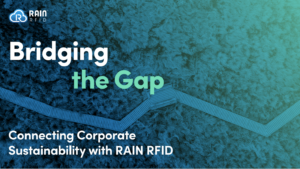 Exciting news! Our new report Bridging the Gap: Connecting Corporate Sustainability with RAIN RFID is officially out! The report is an initiative of the RAIN Alliance Sustainability Work Group. It underscores the transformative potential of RAIN RFID in advancing corporate sustainability efforts.
Exciting news! Our new report Bridging the Gap: Connecting Corporate Sustainability with RAIN RFID is officially out! The report is an initiative of the RAIN Alliance Sustainability Work Group. It underscores the transformative potential of RAIN RFID in advancing corporate sustainability efforts.
In a world where sustainability is becoming increasingly critical, the potential of RAIN RFID to drive positive change is immense. However, our report highlights that despite its widespread use across industries, the connection between RAIN RFID and sustainability is still in its infancy.
Through comprehensive research, including industry surveys and compelling case studies from Decathlon, Michelin, and IFCO, we’ve uncovered valuable insights that shed light on the current state-of-play and the untapped potential of RAIN RFID in advancing sustainability objectives.
Key findings:
- One key finding is the clear disconnect between sustainability goals and RAIN RFID implementation. While 10% of survey respondents identify their role in sustainability or corporate social responsibility, only 1% of them are actively involved in using RAIN RFID in their daily work. This presents a significant opportunity to break down silos and foster collaboration between sustainability departments and RAIN RFID teams.
- The report highlights that existing data gathered through RAIN RFID initiatives, primarily for inventory management and stock control, can be harnessed to advance sustainability objectives. The survey findings indicate that the data gathered via RAIN RFID primarily supports two critical business objectives: supply chain traceability (20%) and inventory management (21%), both of which are intertwined with sustainability use cases such as informing Life Cycle Assessment methodology to provide a more accurate understanding of a product’s footprint. This underscores the importance of leveraging existing data to drive sustainable practices.
- Also identified was a maturity curve in RAIN RFID adoption, with the level of integration between RFID and sustainability teams increasing as companies engage with RAIN RFID over time. Our survey findings show that when a company has been engaged for less than 3 years with RAIN RFID, the average level of integration between RFID and sustainability teams is at 18%. When RAIN RFID has been used for longer than 5 years the average level of integration between the RFID and sustainability teams increases to 80%. This indicates that while businesses initially focus on core objectives, such as supply chain traceability and inventory management, the integration of sustainability goals becomes more prominent as RAIN RFID programs mature.
- Furthermore, with increasing regulatory pressure and the imperative for supply chain traceability, RAIN RFID emerges as a powerful tool to transform challenges into opportunities for innovation and market leadership. In the report, ‘Improving Supply Chain Traceability’ was identified as the highest priority within surveyed companies’ sustainability strategies for 2023 with 47% selecting traceability as an important regulatory driver. As businesses prioritize sustainability objectives alongside broader business goals, RAIN RFID technology becomes instrumental in achieving these objectives.
The report also includes a step-by-step roadmap on how companies can leverage RAIN RFID to achieve sustainability objectives.
